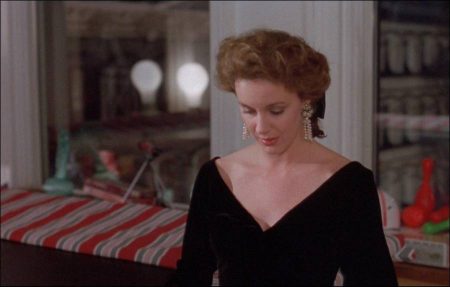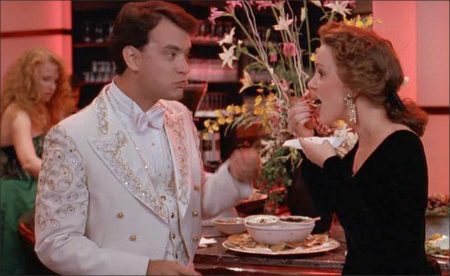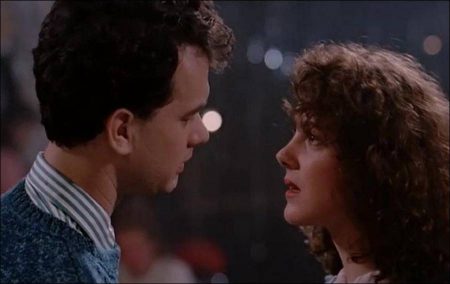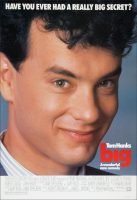Taglines: Have you ever had a really big secret?
Big movie storyline. More than anything else, 13-year old New Jerseyite Josh (David Moscow) wants to be “big”. That’s the wish he makes at an odd-looking amusement pier fortunetelling machine. The next morning, Josh wakes up-only to discover that he’s grown to manhood overnight! (At this point, the part is taken over by Tom Hanks).
Still a 13-year-old mentally and emotionally, Josh decides to hide out in New York City until he can figure out what to do next. He lucks into a job with a major toy company run by kid-at-heart McMillan (Robert Loggia). By cannily bringing a child’s eye view to McMillan’s business, Josh rises to the top-and in process, he falls in love with fellow employee Susan (Elizabeth Perkins). But he’s still a kid, and he’d like to go back to his own world and own body.
Big is a 1988 American fantasy comedy-drama film directed by Penny Marshall, and stars Tom Hanks as Adult Josh Baskin, a young boy who makes a wish “to be big” and is then aged to adulthood overnight. The film also stars Elizabeth Perkins, David Moscow as young Josh, John Heard and Robert Loggia, and was written by Gary Ross and Anne Spielberg. It was produced by Gracie Films and distributed by 20th Century Fox.
Written by Gary Ross and Anne Spielberg, Big proved a crucial success for budding director Penny Marshall, who’d work harmoniously with Hanks again on the radically different A League of Their Own. The cinematography was by Barry Sonenfeld, who went on to become a director himself with The Addams Family. That Big was heavily reliant upon the input of Tom Hanks and Penny Marshall was proven by the failed attempt to turn the property into a Broadway musical.
Upon release, Big was met with wide critical acclaim, particularly for Hanks’ performance. It was a huge commercial success as well, grossing $151 million worldwide against a production budget of $18 million. The film received Academy Award nominations for Best Actor (Hanks) and Best Original Screenplay.
The film opened at #2 with $8.2 million in its first weekend. It would end up grossing over $151 million ($116 million in the US and $36 million internationally). It was the first feature film directed by a woman to gross over $100 million.

Film Review for Big
Insecure moviemakers and timid executives often turn down projects because someone else has done a similar story, made a movie about the same topic, or, in the ultimate save-your-salary cop-out, pass because the pollsters have done an eight-tier, random sampling and found the demographics to be unfavorable.
Happily, 20th Century Fox and producers Robert Greenhut and James L. Brooks took a bolder approach: They made a movie with a storyline that seems to have been the basis for every other comedy made last year — a kid takes over an adult’s body — and they’ve done a terrific job. They can laugh at the cautious committee men and numbskull numbers-crunchers all the way to the bank. This good and very funny movie should win out.
In this pleasingly slapstick comedy, Tom Hanks stars as a 13-year-old video-crazy kid who’s zapped by a carnival machine into the body of a 35-year-old adult. The gangling pre-pube is now an adult in size, but intellectually, emotionally and socially, he’s still an awkward and immature kid who’s got nowhere to turn. Even his mother (Mercedes Ruehl) doesn’t recognize him, and naturally he can’t lurk about his schoolyard. Only his dare-devil best friend (Jared Rushton) appreciates his plight, and gives him the requisite push out of the nest, smack dab into New York City.
The dauntless Rushton realizes a junior-high education and a resume that only includes a paper route need not be an obstacle for his now big-boned pal — he encourages Hanks to apply for a job at a toy company. Wonderfully, Hanks’ games and video savvy impresses the personnel director. Big kid Hanks is promptly hired to develop video games.
Perhaps only the 25-year-old Orson Welles had it so good. Getting paid to play seems to the klutzy kid to be too good to be true. To boot, he doesn’t have to do homework, or pick up his room. All his kids worries are now behind him, and since he doesn’t understand the hypercompetitive, pressurized business world, Hanks doesn’t partake in the corporate games. In short, Hanks plays with games, but he’s not a games-player.
Similar to the premise of the film Being There, such innocence is construed as wisdom. In no time at all, Hanks’ bounding enthusiasm attracts the attention of the company head, an old-style go-with-your-gut guy (Robert Loggia) who is fed up with the advice of the cautious pencil heads who shove marketing reports at him. Loggia finds Hanks’ instincts and goofy enthusiasm a much better barometer of the marketplace than the marketing mush.
In Gary Ross and Anne Spielberg’s delightful, lightly satirical screenplay, the company backstabbing and competitiveness are shown to be more immature than Hanks’ goofy, child-like behavior. In Big, two characters crystallize and symbolize the insecure adult world: a viciously materialistic development executive (John Heard), and his main squeeze, an equally ambitious marketing exec who’s sexually attracted to power.
Although one need not have graduated from a weekend screenwriting seminar to tell where the story is headed, Big is just plain funny and wonderfully goofy throughout. Again, while certainly not a new story or even a new theme, Big is done refreshingly well. Although it winds down with a proper but overstretched climax involving Hanks’ budding relationship with confused career-girl Perkins, the nimble comedy never stumbles too far off course.
Keeping it spry and winningly light, director Penny Marshall doesn’t hammer any themes or satire into the film; she, quite shrewdly, keeps Big likeably small. The comedy is natural and unforced, in no small part because of Hanks’ wonderfully slapstick performance. The versatile Hanks is clearly well coordinated: As the awkward 13-year-old, his stumbling and bumbling are marvelously kid-like, something only a natural athlete could perform.
Robert Loggia as the feisty old toy mogul is a soft-shoe delight, while John Heard as the power yuppie is convincingly loathsome. Elizabeth Perkins shows appropriate vulnerability as the fickle Cosmo-type who is keenly aware that her string of relationships is showing a self-destructive pattern. Jared Rushton is a treat as Hanks’ junior hip pal who doesn’t take any guff from adults.
Big’s technical contributions are just right: Credit costume designer Judianna Makovsky for Hanks’ goofy superhero pjs, and production designer Santo Loquasto for the Toys “R” Us look.
Big (1988)
Directed by: Penny Marshall
Starring: Tom Hanks, Elizabeth Perkins, Robert Loggia, John Heard, Jared Rushton, David Moscow, Mercedes Ruehl, Josh Clark, Kimberlee M. Davis, Erika Katz, Allan Wasserman, Mark Ballou
Screenplay by: Gary Ross, Anne Spielberg
Production Design by: Santo Loquasto
Cinematography by: Barry Sonnenfeld
Film Editing by: Barry Malkin
Costume Design by: Judianna Makovsky
Set Decoration by: Susan Bode, George DeTitta Jr.
Art Direction by: Speed Hopkins, Tom Warren
Music by: Howard Shore
MPAA Rating: PG for adult situations and language.
Distributed by: 20th Century Fox
Release Date: June 3, 1988
Views: 559


